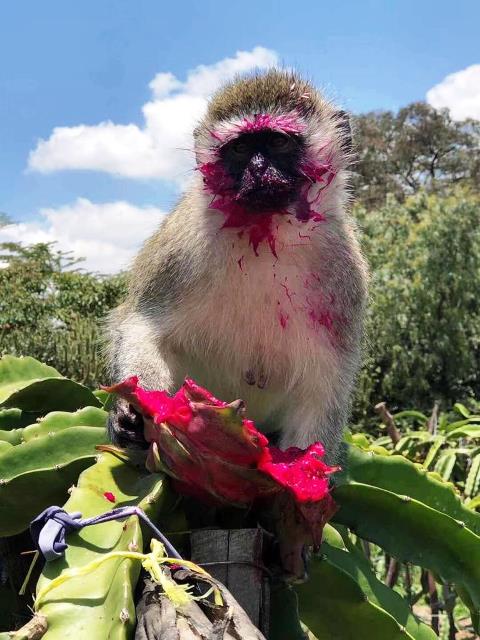
Necessity is the mother of intervention and Karimi knows that only too well.
Karimi and some farmers in Mitheru in Maara who grow assorted food crops including vegetables said for an agonizingly long time they had suffered losses running into millions of shillings caused by monkeys and other primates, yet the Kenya Wildlife Service had not gone to their rescue.
The farmers have resorted to deploying ingenious methods of curbing the monkey menace in various areas in Maara Sub County, because of what they termed lack of decisive action to tame the monkeys which had invaded their farms for as long as they can remember.
Despite placing cages that act as traps for the monkeys and stoning them the monkeys kept on coming back, Karimi said.
While the residents were cagey about how they are going about curbing the problem, they revealed their ways of handling the monkeys were harmless. A section said they were now trapping the monkeys after getting them drunk and giving them a beating of their life as a deterrence measure.
Charles Murithi who grows potatoes, beans, maize, and other crops, said getting the monkeys drunk on traditional liquor and thrashing them with a strong cane, had proved more effective.
“We know killing the monkeys is not good because KWS people will arrest and prosecute us. But I have found that caning them thoroughly has done wonders in discouraging them from our farms,” said Murithi.
He said before they placed beehives at the edge of the forest in their farms, but they were not as effective as the beating.
“Monkeys fear bees because of the painful stings but there is no assurance bees will attack them when they come into farms. So we chose to deal with them ourselves, in the manner we know best,” Murithi stated. “When you catch a monkey and beat the daylights out of it is very good in deterring them. The idea is to catch as many as possible and then using carefully selected canes to whip them after they get drunk,”’ he said.
Murithi said coupled with the beating, the hangover the primates suffer is also an added bonus.
“When the monkeys get drunk it is easy to catch them. Mostly we are in groups when the monkeys drink from the beer basins we fill and place strategically. They love the nicely fermented beer whose ingredients consist of sugar, a little honey, and a few others,” he told The Eastern Newspaper.
Once the monkeys have their fill they are disoriented and weaker in the leg and thus cannot make a quick getaway when the farmers charge at them.
“The greedy monkeys drink faster than others and their children. After the beer is finished, when the alcohol has not started to take effect, they start feeding on the crop, but soon enough they get disoriented and some just sit there, not knowing what is happening!” said Kimathi Mbaabu.
Mbaabu said they treat the monkeys differently when it comes to whipping them. ”The adults we beat without mercy, including hard punches on the chin. We whip their backsides and punch in the face. Then we let them stagger away back to where they came from. Some cannot find their way back to the forest so we carry and dump them there,” Mbaabu said.
He said the baby monkeys are treated differently and get few lashes of the cane. “Most of the time it is the adults who partake of the alcohol, but a few babies do too. We easily surround and get hold of the smaller ones because they are not as fast. Those we whip a little harder than we whip our own children,” he said.
They never come back, he stated.
“A few of my colleagues have castrated and circumcised a few male monkeys but I oppose that. My friends say it is a way of ensuring the population of monkeys does not grow. I think castrating them is going too far.”
The farmers said whipping the monkeys was harmless and claim it is not against the law as what they are doing is the same way they deal with children who misbehave.




